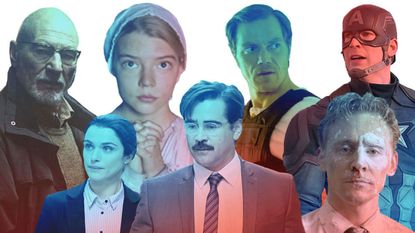

The year is now more than half over, and a review of the past seven months makes clear that cinephiles have been spoiled with sterling movies, from blockbuster superhero sagas and low-budget horror thrillers to bizarre dystopian comedies and politically oriented foreign imports. While at least a few critically hailed works have so far slipped past us, our halfway-point assessment proves that, whether at the multiplex or the art house, filmgoers have already been blessed with a bounty of great offerings in 2016.
25.Captain America: Civil WarCaptain America: Civil War
Marvel's superhero team-up treads the same territory as rival DC's Batman v Superman: Dawn of Justice. Though it doesn't have that competitor's distinctive personality—instead opting for its trademark colorful aesthetics and competent storytelling conventions—it's nonetheless one of the comic-book studio's best. Deftly integrating new characters into its bursting-at-the-seams fold (including Chadwick Boseman's righteous Black Panther), Joe and Anthony Russo's blockbuster charts the battle between Chris Evans' Captain America and Robert Downey Jr.'s Tony Stark (AKA Iron Man) over a government plan to register—and thus regulate—the world's escalating superhero population. Only half-heartedly interested in the moral dilemmas it poses, Civil War is best as a vehicle for thrilling mix-and-match conflicts, culminating with a titanic airport showdown in which Paul Rudd's diminutive (and, then, not-so-diminutive) Ant-Man turns out to be the unlikely center of attention—at least, that is, until Tom Holland's wise-cracking Spider-Man arrives to truly steal the show.
24. The Wave
Further proof that the best Hollywood movies aren't always actually made in the U.S., The Wave is a Norwegian disaster film that puts its recent American brethren (we're looking at you, San Andreas) to shame. Affecting a this-could-really-happen pose, Roar Uthuag's film recounts the catastrophe that befalls the tiny town of Geiranger after the surrounding Akerneset mountains begin to crumble, causing an avalanche of rocks to plummet into the watery fjord below—thus generating a tidal wave of disastrous proportions. Although Uthuag's geologist protagonist and his in-peril family may be somewhat stock types, the director establishes the scientific reality of his premise so thoroughly, and with such mounting dread, that when calamity finally strikes, it does so with suspenseful force. Manipulative in all the right impending-doom ways, The Wave reconfirms the enduring effectiveness of age-old gimmicks and devices when employed by talented craftsman.
23. The Witch
Subtitled "A New-England Folktale," writer/director Robert Eggers period-piece horror film has the aged look and fundamentalist-craziness atmosphere of a spooky bedtime story. In the northeast during the 17th century, a family is banished from a protestant plantation, leading them to establish a new farm on the edge of a forest rumored to be home to an evil witch. When the clan's infant inexplicably disappears, paranoia about nearby supernatural beings escalates, with the father and mother soon coming to suspect that their eldest daughter Thomasin (Anya Taylor-Joy) is in fact the wicked creature. While the final scene does much to undercut the action that's preceded it, Eggers dramatizes his material with disquieting patience, the better to let the air of religious mania grow oppressive. And in the figure of Black Phillip—a goat that the family's young twins claim converses with them in secret—he crafts an enduring vision of otherworldly Satanic terror.
22. Triple 9
John Hillcoat's The Proposition and The Road both presented bleak visions of a brutal, chaotic world, and his latest, the criminally underrated Triple 9, proves no different. Led by a phenomenal ensemble that includes Casey Affleck, Chiwetel Ejiofor, Anthony Mackie, Aaron Paul, Clifton Collins Jr., Norman Reedus, Woody Harrelson, Gal Gadot, Michael K. Williams, and Kate Winslet as a ruthless, giant-haired Russian Mafioso bigwig (a transfixing over-the-top performance of heavily accented villainy), Hillcoat's film involves a consortium of corrupt cops and professional crooks who are threatened by Winslet's boss into robbing a government building. To do so, they use a "triple 9" police code (to indicate an officer is down) to distract law enforcement agents, although as is usually the case in such genre films, things don't go as planned. With the police hot on their trail, the felons soon find themselves with limited options for survival, and while that basic scenario routinely feels familiar, Hillcoat electrifies his action by drenching it in a gritty, grimy coat of inescapable—and haunting—apocalyptic despair.
21. Love & Friendship
Whit Stillman brings a caustic drollness to his adaptation of Jane Austen's posthumously published novella Lady Susan about the recently widowed titular character (Kate Beckinsale), whose effect on men is both the source of her strength and the reason at least one of her compatriots views her as disagreeably devious. Stillman's comedy of manners focuses on Lady Susan's visit to the estate of close acquaintances, where she meets—and strikes up a troublesome-to-others relationship with—a handsome bachelor (Xavier Samuel), all while keeping company with her Connecticut-born best friend (Chloe Sevigny) and dealing with the unexpected arrival of her daughter (Morfydd Clark). The complications that spring forth from this drawing-room scenario soon prove knotty, and Stillman handles his various players' intersecting desires and machinations with a light, breezy touch. Beckinsale has never been more subtly charming as the cunning object of everyone's affection (or, at least, attention), and Tom Bennett's doltish Sir James Martin—a man whom Lady Susan intends to have marry her daughter—is arguably the year's most hilariously absurd character.
20. 10 Cloverfield Lane
Its title suggests a connection to the J.J. Abrams-produced 2008 found-footage monster mash Cloverfield, and its bombshell-dropping finale certainly furthers that affiliation. In most respects, however, Dan Trachtenberg's film—originally conceived as a standalone film, unrelated to a presumptive Cloverfield franchise—is simply a nifty claustrophobic thriller that often feels like a lost episode of The Twilight Zone. Aside from its brief bookending sequences, Trachtenberg's story is set entirely in the bomb shelter of John Goodman's survivalist antagonist, where Mary Elizabeth Winstead's young woman awakens (after a car accident) to hear that the world has been fatally contaminated during some sort of ill-defined doomsday attack. Whether Winstead can believe Goodman's bunker dictator proves the crux of this beguiling mystery, which ratchets up tension with painstaking patience and care. With John Gallagher, Jr. as the subterranean shelter's third inhabitant, 10 Cloverfield Lane develops and exploits its characters' frazzled dynamics with anxiety-inducing results, and in the process provides the always great Goodman with a role of alarming ambiguous motivations.
Stay In The Know
Marie Claire email subscribers get intel on fashion and beauty trends, hot-off-the-press celebrity news, and more. Sign up here.
19. High-Rise
Tom Hiddleston winds up at the center of class-warfare carnage after moving into a swanky 1970s apartment complex in High-Rise, Ben Wheatley's aggressively unpleasant—in the funniest way possible—adaptation of J.G. Ballard's 1975 novel of the same name. In this socio-cultural cross-section abode, the haves enjoy the finer things in life on the top floors, while the have-nots scrape by on the ground floors. Such stark divisions soon come to a head, much to the chagrin of Hiddleston's mild-mannered doctor. An opening sequence featuring Hiddleston's character killing and spit-roasting a dog serves as an adequate preface for the ensuing, grim action, which involves various residents (Elisabeth Moss, Sienna Miller, Luke Evans) battling it out for control of the building, whose architect and owner (Jeremy Irons) inhabits a penthouse replete with an outdoor garden and a horse for his wife. It's a stinging, surreal critique that devolves into blistering black-comedy madness.
18. Knight of Cups
Terrence Malick's cinema has increasingly strayed toward the insistently poetic, peaking with 2013's love-it-or-hate-it To the Wonder, in which spinning female figures and Ben Affleck's narration-driven brooding pushed the director toward self-parody. His follow-up, Knight of Cups, affects a similar style marked by rapturously dreamy cinematography from Emmanuel Lubezki (winner of the last three Oscars for Gravity, Birdman, and The Revenant) that casts Los Angeles as both an entrancing wonderland and an ominous, illusive wasteland. At the center of its swirl is Christian Bale's screenwriter, who embarks on a reflective quest for self-definition and purpose in a Hollywood milieu of fetid superficiality and depravity. While it treats most of its female characters as mere fleeting figures drifting in and out of Bale's life (including Cate Blanchett and Natalie Portman), Malick's impressionistic aesthetics are often thrilling, and allow him tap into a potent strain of celebrity disaffection, as well as a more universal sense of emotional, spiritual, and existential crisis.
17. Men Go to Battle
The Civil War further drives a wedge between two brothers in this unconventional, evocative period piece from first-time director Zachary Treitz. In rural Kentucky, David Maloney and Tim Morton's siblings find themselves in a desperate bind thanks to both a homestead that doesn't provide enough to live off of, and their inability to sell off a large part of their acreage before the coming winter. While their jovial rabble-rousing at first comes across as an example of their closeness, later incidents reveal the underlying resentments slowly tearing them apart—and culminate with Morton's character suddenly ditching his relative to go off and join the Union Cavalry. It's a muted story that's handheld aesthetics amplify its dreaminess, though more memorable still is its immersive soundscape of groaning floorboards, clicking footsteps along stone paths, and kindling crackling in nocturnal fires, which has the effect of imparting a potent feel for its tale's long-ago time and place.
16. Deadpool
Yes, Deadpool's smarty-pants R-rated humor is of a juvenile, puerile sort. And yes, its incessant meta antics often make it feel like it was specifically produced for ADD-afflicted, smartphone, and Internet-obsessed teenage boys. Still, those qualities don't overshadow the fact that, thanks in large part to Ryan Reynolds' pitch-perfect performance as Marvel's red-clad, quip-spewing assassin, this profane and ultra-violent film functions as a giddy rejoinder to the rest of the formulaic, play-it-safe superhero field. Charting the motormouthed antihero's transformation (through cancer-curing genetic modification) into a limb-regenerating force of murder, Tim Miller's blockbuster isn't so much subversive—amidst its naughty behavior, it hits all the familiar narrative beats—as just rampantly silly and eager to indulge in self-deprecating, self-referential, ridiculousness. Making jokes at the expense of Fox's fellow X-Men while subtly showing up that stodgy series at every turn, it's an ideal adaptation of Marvel's popular ne'er-do-well protagonist, and likely also a sign of things to come from the genre.
15. Kaili Blues
A lyrical import about the circular relationship between the present and the past, Kaili Blues heralds an exciting new filmmaking voice in debut director Bi Gan. In this haunting, elliptical tale, a physician travels to his hometown to rescue his nephew, who's been unceremoniously dropped there by his disreputable gambler father. Gan sets up this story in an oblique fashion, full of subtle allusions and offhand implications. Once the proceedings move to the protagonist's rural childhood stomping ground, the director captures his action via a 41-minute handheld single-take that's breathtaking in its formal dexterity. This tour-de-force sequence, in which numerous characters and relationships are introduced and developed, is powerfully attuned to its subjects' uneasy circumstances, even as it self-consciously calls attention to itself (via bobbing and weaving movements that suggest the director's own just-off-camera presence). The result is a uniquely mesmerizing portrait of people caught in a purgatory between what came before and what's still to come.
14. Midnight Special
Jeff Nichols is one of mainstream American cinema's most exciting voices, and while his upcoming release—this fall's Loving, about the landmark U.S. civil rights case that invalidated laws prohibiting interracial marriage—is already garnering Oscar buzz, his first 2016 film, Midnight Special, is itself a superb character study, albeit of the supernatural sort. Akin to a hybrid of Firestarter, John Carpenter's Starman, and Spielberg's early works, Nichols' fourth feature concerns a father (the director's favorite leading man, Michael Shannon) on the run with his son (Jaeden Lieberher), who possesses paranormal powers involving light-beams emanating from his eyes. They're pursued by both members of the cult to which they belonged and the FBI (including Adam Driver's agent), and Nichols orchestrates their flight from capture with a vigorousness that never interferes with his intimate portrait of their tough father-son bond. It's an otherworldly mystery cast in human dimensions, and aided by great performances from Shannon, Driver, Lieberher, Joel Edgerton (as Shannon's friend), and Kirsten Dunst (as the boy's mother).
13. The BFG
Steven Spielberg, making his first movie for Disney, from a script by E.T. screenwriter Melissa Mathison, from the beloved 1982 children's book by Roald Dahl: The BFG seemed like a slam-dunk summer hit, at least until audiences avoided it in droves. As it turns out, it was their loss. Far from the debacle implied by its poor box-office showing, Spielberg's latest, about a young British orphan (Ruby Barnhill) swept along on a magical quest alongside a Big Friendly Giant (Mark Rylance, in a motion-captured animated performance), is a consistently wondrous fable about friendship, tolerance, and togetherness. Unfolding in winding, whimsical fashion, it provides a cornucopia of enchanting sights while also delivering one of the movies' all-time great scenes involving farting (featuring none other than the Queen of England). Spielberg's lovely visuals lead the way, although it's Rylance's elegant and heartfelt performance as the title character—his expressive eyes conveying a wealth of poignant lonely-outsider emotions—that truly elevates it above this year's family-film pack.
12. The Neon Demon
Nicolas Winding Refn may be international cinema's most polarizing figure, a Stanley Kubrick-indebted filmmaker whose stylish violence is often put in service of celebrations-cum-critiques of twisted aggro masculinity. Here, however, he turns his attention to Los Angeles' fashion industry for the story of a young beauty (Elle Fanning) striving to make it as a professional model. As befitting a Refn movie, The Neon Demon's action is methodical, detached, and chilly, and it lavishes attention on the superficial glitz and glamour of its milieu while positing its protagonists as so hungry for the spotlight that they'll do anything to achieve it. Eventually devolving into a prolonged, profane joke about the hunger for fame (and youth, and beauty, and power), the film has a coiling, serpentine malevolence that operates in harmony with its devilish sense of humor, all of which climaxes during a finale of sick satiric nastiness.
11. Hush
Hush is the first of director Mike Flanagan's three 2016 releases (the second is this September's Before I Wake, the third is October's Ouija: Origin of Evil), and even though it was only released as a Netflix exclusive, this expertly executed thriller generates an impressive amount of terror from its bare-bones set-up. At a remote rural cabin, a deaf-mute author named Maddie (Flanagan's wife, Kate Siegel) finds herself menaced by a masked predator whose intentions don't extend past wanting to torment and then kill her. Their cat-and-mouse showdown is plotted with a preponderance of rational decision making and a dearth of stupid what-are-they-doing? moments, and the material's consistent character-based internal logic goes a long way toward maintaining its sinister suspense. There's nothing particularly fancy about Hush, but it does what all great economical thrillers do: It maximizes the terror promised by its premise through deft narrative and visual storytelling.
10. Kill Zone 2
Don't worry if you haven't seen the 2005 precursor to this Hong Kong-Chinese import (also known as SPLII: A Time for Consequences)—aside from their titles, the two films share no relationship. And don't worry if you can't follow its myriad crime-saga plot strands, which involves a dying Hong Kong gangster (Louis Koo) who sells organs on the black market and plans to kill his brother so he can steal his heart, a Hong Kong undercover cop (Wu Jing) intent on infiltrating this kingpin's gang, and a Thailand prison guard (Tony Jaa) trying to save his daughter who is dying of leukemia. What matters here is that director Cheang Pou-soi's film features the finest hand-to-hand skirmishes of the year, with Wu Jing demonstrating deft martial-arts skills and Jaa—he of Ong-Bak: The Thai Warrior fame—bringing the concussive thunder via his trademark elbow drops and flying knee attacks, which peak with him leaping, knees first, through the windshield of a moving bus. The film's melodrama and comedy (including a subplot involving a Down's Syndrome-afflicted teen texting with a dying child via emojis) are overcooked, but Jaa and Jing's fighting prowess make this a must-see for genre aficionados.
9. The Nice Guys
Shane Black perfected the mismatched buddy-cop formula with 1987's Lethal Weapon, so it's no surprise that, 29 years later, he's delivered another bickering-duo gem set in the L.A. underworld. In this thoroughly amusing 1970s neo-noir comedy, Ryan Gosling is a bumbling private investigator who finds himself paired with Russell Crowe's for-hire enforcer on a case involving a missing girl and a dead porn star. As they make their way through a seedy showbiz landscape, Crowe and Gosling prove an irresistibly combative, cantankerous pair, with Crowe's gruff exasperation clashing with Gosling's doofus bumbling. Energized by a dry, wry cynicism that borders on fatalistic desperation, The Nice Guys is an idiosyncratic crime romp that builds humorous momentum as it moves towards its mystery-unraveling conclusion. Plus, Gosling's impromptu Lou Costello homage is one for the ages.
8. Chevalier
Like her Greek countrymate (and frequent collaborator), The Lobster director Yorgos Lanthimos, Athina Rachel Tsangari is a droll social satirist, and her latest plays like an opposite-sides-of-the-gender-coin companion piece to 2010's Attenberg. Here, Tsangari's focus is a group of men on a deep-sea fishing trip who decide that they'll pass the time by playing an elaborate "game" to determine which of them is "The Best in General." To figure out who deserves that lofty title, these self-centered individuals set about judging each other in every conceivable manner. That, in turn, leads them to behave in increasingly competitive ways, all of which Tsangari depicts with a cool detachment that only further heightens the scathing absurdity of their loony decisions and actions. Mocking the macho male psyche with sharp observations about masculine aggression and ego, it boasts a deadpan wit accentuated by cinematography that places a premium on off-kilter imagery.
7. Embrace of the Serpent
Something like a cross between a long-lost documentary and Francis Ford Coppola's Apocalypse Now, Columbian writer-director Ciro Guerra's drama charts two hallucinatory courses—during distinct, and yet eerily similar, time periods—through the Amazon. In both stories, a German interloper seeks assistance from a native shaman in his quest for a plant that reportedly has magical healing qualities, with both separated-by-decades journeys revealing the ways in which Western interlopers has affected the region and its indigenous cultures. Shot in beautiful black-and-white, Guerra's trance-like tale is rich in ethnographic details, and its lead performances from non-professional actors Nilbio Torres and Antonio Bolivar Salvado Yangiama (both as the shaman) are unaffected and haunting. Though highly critical of the damage wrought by modern civilization in this untamed land, it's a film that refuses to simplistically lecture, instead ultimately expressing a mature ambivalence about colonialism's complicated legacy.
6. The Invitation
For her first feature since 2009's Jennifer's Body, Karyn Kusama delivers one of the year's great gripping thrillers with The Invitation, an intensely unnerving story about a Los Angeles man (Logan Marshall-Green) who, with his girlfriend in tow, attends a dinner party hosted by his ex-wife (Tammy Blanchard) and her new boyfriend (Game of Thrones' Michiel Huisman)—an awkward situation compounded by the fact that Marshall-Green and Blanchard's characters split following the death of their young child, which neither has properly gotten over. Kusama shrewdly lays out her psychological dynamics, and she imbues her action with an eeriness that suggests there's more to this get-together than initially meets the eye, and which slowly builds to near-unbearable levels. By the time its revelations finally arrive, The Invitation has become a small-scale masterwork of sustained anxiety, and all the more chilling for casting its eventual horrors as the natural byproduct of madness begat by grief.
5.Mountains May Depart
No filmmaker has been more adept at examining China's political/culture climate than acclaimed director Jia Zhangke, and his latest only reaffirms that standing. A story split in three, Zhangke's trifurcated drama—with each chapter shot in ever-expanding visual aspect ratios—concerns three friends caught in a love triangle on the eve of the millennium. While that dawn-of-a-new-century moment is infused with pressing hope, the subsequent development of these men and women's lives—involving marriage, children, divorce, and illness—provides depressing rejoinders to their early optimism. Rife with bemused commentary about the alienating role technology plays in interpersonal relationships, and opening and closing with tonally opposite dance sequences that further underline its intricate thematic arguments, Mountains May Depart is an alternately funny and morose study of a country's (and global society's) evolution, and its positive and negative ramifications for its inhabitants.
4. The Fits
No 2016 debut has been as striking as Anna Rose Holmer's The Fits, an immaculately conceived and executed small-scale indie about a young African-American girl named Toni (superb newcomer Royalty Hightower) who, while living in Cincinnati's West End, spends her time working out at a local boxing gym with her brother, even as she increasingly finds herself drawn to the championship-winning dance team that practices in the same facility. Holmer's precise aesthetics echo her protagonist's detachment from both the pugilistic and dance cliques from which she seeks acceptance, and her slow-motion sequences of the troupe's rhythmic routines have an overpowering, hypnotic grace and splendor. Fixated on Hightower's subtly expressive countenance and her spatial (and emotional) relationship to her peers, the film is more than just a coming-of-age saga; it's an expressionistic snapshot of a young girl trying to transcend her estrangement, define her identity, and find a place for herself in the world.
3. Louder Than Bombs
Joachim Trier isn't a household name in America, but the Norwegian filmmaker's first two features—2006's Reprise and 2011's Oslo, August 31st—were startlingly incisive dramas about young men struggling with issues of adulthood, responsibility, and regret. His third feature, and first in English, is this sterling work about a teacher (Gabriel Byrne) and his two sons, married Jonah (Jesse Eisenberg) and disaffected high-schooler Conrad (Devin Druid), trying to come to terms with the death of their famous photographer matriarch Isabelle (Isabelle Huppert). That woman's shadow, and the secrets she took to her grave, loom large over their present, fraught-with-friction circumstances, which Trier investigates with a novelist's attention to his character's interior lives. Employing subtle visual framing and numerous narrative devices (most forcefully, flashbacks), Trier's Louder Than Bombs is less than explosive look at out-of-control emotions than a slow-burn portrait of miserable loved ones desperately trying to reconnect, as well as to reconcile their personal, artistic and familial desires.
2. Green Room
The most hardcore thriller in years, Jeremy Saulnier's follow-up to 2013's critically acclaimed Blue Ruin is another exercise in extreme, nail-biting suspense, this time about a just-scraping-by punk band (comprised of the late Anton Yelchin, Alia Shawkat, Joe Cole, and Callum Turner) that unwisely decides to accept a gig at a rural neo-Nazi music club. When they happen to witness the aftermath of a murder, they become captives of the resident skinheads and their leader (a terrifying Patrick Stewart), leading to a prolonged showdown which Saulnier stages as a series of quiet, panic-stricken moments and bursts of brutal violence—a storytelling rhythm in tune with the sludgy punk and metal thundering through the venue's speakers. A relentless assault on one's nerves that pummels viewers with the same all-out viciousness exhibited by the racists slam-dancing around the venue's grimy, beer-soaked floors, Green Room (which we dubbed "mosh-pit cinema") leaves a lasting mark.
1. The Lobster
Greek director Yorgos Lanthimos' The Lobster is one of the strangest movies in recent memory—and one of the most hilariously (and surprisingly profound) ones as well. In this pitch-black future-society saga, a single man (Colin Farrell) checks into a hotel where, by law, he must find a mate within 45 days or be transformed into the animal of his choice. (His preference? A lobster.) In that wacko locale, Farrell's lonely loser pals around with other equally strange sorts, and tries to forge a romance with a female counterpart, before eventually fleeing for the woods where anti-monogamy rebels are stationed. A deadpan dystopian comedy that also functions as a bizarro-world examination of love, relationships, marriage, and the basic human desire for connection, Lanthimos' film is that rare thing in today's cinema: an unqualified original.
Nick Schager is a NYC-area film critic and culture writer with twenty years of professional experience writing about all the movies you love, and countless others that you don’t.
-
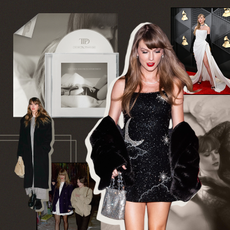 How Do You Dress Like a Tortured Poet?
How Do You Dress Like a Tortured Poet?Taylor Swift’s new fashion era reflects the moody tone of her album.
By Sarah Chapelle Published
-
 Kendall Jenner Suits Up Like a Corporate Siren
Kendall Jenner Suits Up Like a Corporate SirenThe model's dark olive set is serving "return to office."
By Julia Gray Published
-
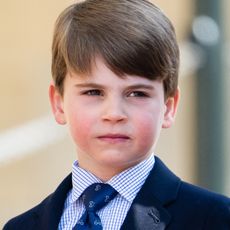 Royal Commenter Explains Why Prince Louis’ Birthday Photo Was Released Slightly Later Than Normal
Royal Commenter Explains Why Prince Louis’ Birthday Photo Was Released Slightly Later Than NormalThe photo wasn’t released until midday in the U.K. on April 23, leading some to wonder if the Wales birthday tradition had ended for good.
By Rachel Burchfield Published
-
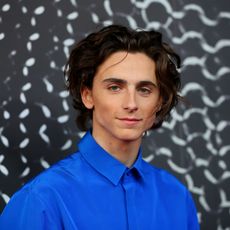 How Timothée Chalamet's "Emotional Intelligence" Will Transform the Character of Willy Wonka
How Timothée Chalamet's "Emotional Intelligence" Will Transform the Character of Willy WonkaLiterally perfect casting.
By Iris Goldsztajn Published
-
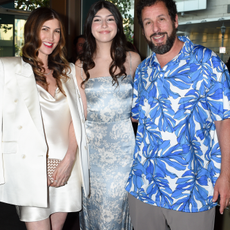 Adam Sandler Brought His Wife Jackie and Lookalike Daughter Sunny to 'The Out-Laws' Premiere
Adam Sandler Brought His Wife Jackie and Lookalike Daughter Sunny to 'The Out-Laws' PremiereSo cute!
By Iris Goldsztajn Published
-
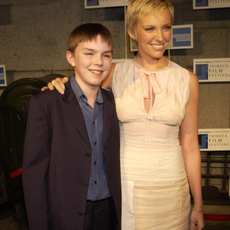 Nicholas Hoult Told Toni Collette He Still Thinks of Her as His Mom When He Watches One of Her Movies
Nicholas Hoult Told Toni Collette He Still Thinks of Her as His Mom When He Watches One of Her MoviesI love this so much.
By Iris Goldsztajn Published
-
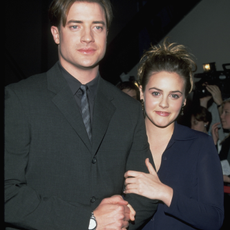 Alicia Silverstone Would Totally Do a Sequel to The '90s Rom-Com She Starred In Opposite Brendan Fraser
Alicia Silverstone Would Totally Do a Sequel to The '90s Rom-Com She Starred In Opposite Brendan FraserDid you guys know about this movie??
By Iris Goldsztajn Published
-
 Jennifer Grey Spotted Someone Watching 'Dirty Dancing' on a Plane on Valentine's Day
Jennifer Grey Spotted Someone Watching 'Dirty Dancing' on a Plane on Valentine's DayFact: This is the best thing that's ever happened.
By Iris Goldsztajn Published
-
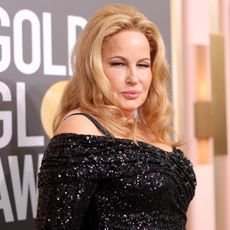 Jennifer Coolidge Would Definitely Be "On Board" to Film 'Legally Blonde 3'
Jennifer Coolidge Would Definitely Be "On Board" to Film 'Legally Blonde 3'YES!!!
By Iris Goldsztajn Published
-
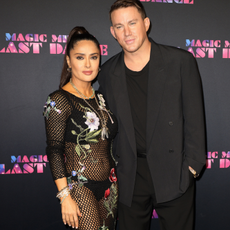 Salma Hayek Says Channing Tatum Almost "Killed" Her During a Lap Dance for 'Magic Mike's Last Dance'
Salma Hayek Says Channing Tatum Almost "Killed" Her During a Lap Dance for 'Magic Mike's Last Dance'LOL, Salma.
By Iris Goldsztajn Published
-
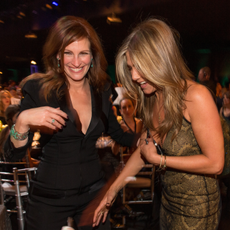 Julia Roberts and Jennifer Aniston Are Body-Swapping in an Upcoming Comedy, And It Might Be the Best News I've Ever Received
Julia Roberts and Jennifer Aniston Are Body-Swapping in an Upcoming Comedy, And It Might Be the Best News I've Ever ReceivedClearly, I've lived an uneventful life.
By Iris Goldsztajn Published